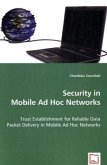This thesis introduces an integrated security framework that enables secure formation, evolution and management of ad-hoc networks. An ad-hoc network is perceived as a community of autonomous devices interconnected through wireless links. The establishment of this community is based on a doctrine that defines the roles of participants, the characteristics that participants must exhibit in order to be eligible to join the community in a specific role, as well as policies governing their behaviour within the community. Lightweight management and security protocols are designed to facilitate the interaction in the community. Authentication of devices and verification of credentials rely on security information available in the device as well as information provided by the doctrine and by other peers in the community. The framework also optimises the access control mechanism by reducing the redundancy in the verification of credentials. A prototype implementation has been developed and then simulated in order to demonstrate its practical feasibility.
Bitte wählen Sie Ihr Anliegen aus.
Rechnungen
Retourenschein anfordern
Bestellstatus
Storno








